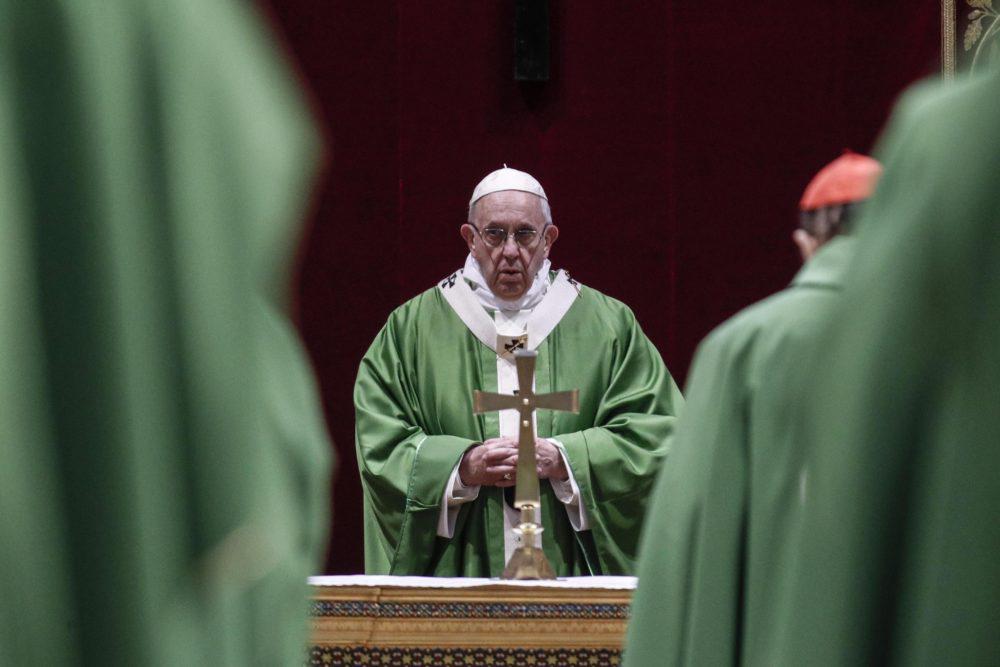|
God’s Work Against Child Abuse Will Be Done By States, Not The Vatican
By Rich Barlow
The moral order has flipped upside down when civil authorities must force religious leaders to honor the Eighth Commandment against lying. Yet we are in such a Bizarro World, as I learned after my native New Jersey was among a half dozen states to investigate Catholic dioceses, following Pennsylvania’s searing catalog of decades of abuse of 1,000 children by hundreds of priests. In the wake of Jersey’s probe, Catholic dioceses in the state recently released the names of priests credibly accused of abuse. Monsignor Thomas J. Frain, pastor of my childhood parish, was among them. (He, like many on the list, is deceased.) Though the nature of his abuse and age of his victim(s) weren’t specified — priests have preyed on adults, including nuns, as well as kids — I thank God that neither my brother nor I were ever altar boys or left alone with him.
I mention this by way of suggesting, as a practicing Catholic, that attention to the just-ended Vatican summit on child abuse is misplaced. If it’s church reform you want, turn your gaze from Rome to U.S. states, where law enforcement, having lost patience with Catholic leaders (as have we in the laity), have started probing abuse. Post-Pennsylvania, New Jersey was joined by New York, Nebraska, Illinois, Nevada and Missouri in hitting bishops with subpoenas or demands for records. Many abusive priests will escape justice, having run out either life’s clock, like Frain, or the statute of limitations. Still, I’d place my faith in prosecutors over prelates. Four days of Vatican talk about Pope Francis’s “reflection points” — including psychological testing of seminarians (that’s not being done already?), mandatory conduct codes (don’t molest kids isn’t clear enough?), an independent group to receive abuse reports (we already have that. It’s called the police.) — ended with no specific proposals, which wouldn’t exorcise the abuse demon anyway. Internal reform must be more radical; in particular, the case for ordaining women, never on the table in Rome, was bolstered by recent revelations of widespread sexual assault in the Southern Baptist Convention, which also has an all-male clergy. Victims as young as 3-years-old “were molested or raped inside pastors’ studies and Sunday school classrooms,” according to the horrific Houston Chronicle story that broke the news. The problem, a Harvard professor of Christian morals told the New York Times’s Nicholas Kristof, is that “prohibiting women from the highest ranks of formal leadership fosters a fundamentally toxic masculinity.” My argument for women priests is much simpler. Research shows that pedophiles are overwhelmingly male. Ordain fewer people disposed to pedophilia and you’re likely to get, surprise, less pedophilia. (You’d also eliminate the inequity of barring women from clerical leadership.) Some suggest that discarding the Catholic celibacy requirement for priests is the solution. While I support that change for other reasons, the case for it as the antidote to pedophilia doesn’t pass the giggle test. Men who force themselves on children are not just horny guys seeking consensual, adult relationships. Take away mandatory celibacy and they would still crave a form of sex as depraved as it is illegal. Garry Wills, the Catholic historian whose writings I admire and learn from, agrees celibacy isn’t the cure, though his suggestion to abolish the priesthood is even more a moonshot than allowing priestly marriage. Alternative proposals, including some from abuse survivors, suffer the same two defects as the “reflection points:” One, there are cultures in the world where Catholic leaders either just don’t get it, downplaying abuse as non-criminal or the result of homosexuality, or else are preoccupied with other issues like war and poverty. Rules in Jersey won’t play in India or Italy. Two, enforcing rules relies on self-policing by a church that has shown it can’t be trusted to self-police. Not when the summit revealed the destruction of church records containing abuse accusations.
I suspect I’d get agreement from the many good men in the clergy. The bishop of Albany, N.Y. asked the local DA to review diocesan records, writing to Catholics in his flock that “in an effort to restore a sacred trust that has been broken again and again, I believe a fully independent investigation, one coordinated by the district attorney, is the only way forward.” That “only way forward,” ceding investigations to secular law enforcement, will make it easier for those of us who want to stay in the church. Non-Catholics will ask why we bother, to which journalist Margery Eagan had the best answer: Catholics of good will are unwilling to let pedophiles drive us out of our church, which, at its best, nourishes us spiritually, feeds the hungry and heals the sick. We’re also unwilling to let our Catholic brothers and sisters who cringe at female ordination have the sole say in defining Catholicism. Traditionalist deference to the hierarchy and its interpretation of apostolic tradition helped foster the clericalism that landed us in this crisis to begin with. To get out of it, we must look to Caesar’s forces, not God’s.
|
.
Any original material on these pages is copyright © BishopAccountability.org 2004. Reproduce freely with attribution.
